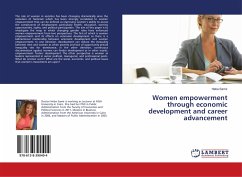The role of women in societies has been changing dramatically since the evolution of feminism which has been strongly correlated to women empowerment that can be defined as improving women's ability to access the constituents of development particularly health, education, earning opportunities, rights, and political participation. The aim of this paper is to investigate the ways in which changing gender roles have enhanced women empowerment from two perspectives. The first of which is women empowerment and its effects on economic development as there is a bidirectional relationship between economic development and women empowerment. In one direction, development can reduce the inequality between men and women as when poverty and lack of opportunity prevail inequality vies for dominance; in the other direction, continuous discrimination against women can hinder development or in other words, empowerment fosters development. The other perspective is women as leaders represented in senior political, managerial, and professional posts. What do women want? What are the social, economic, and political issues that women's movements act upon?
Hinweis: Dieser Artikel kann nur an eine deutsche Lieferadresse ausgeliefert werden.
Hinweis: Dieser Artikel kann nur an eine deutsche Lieferadresse ausgeliefert werden.








